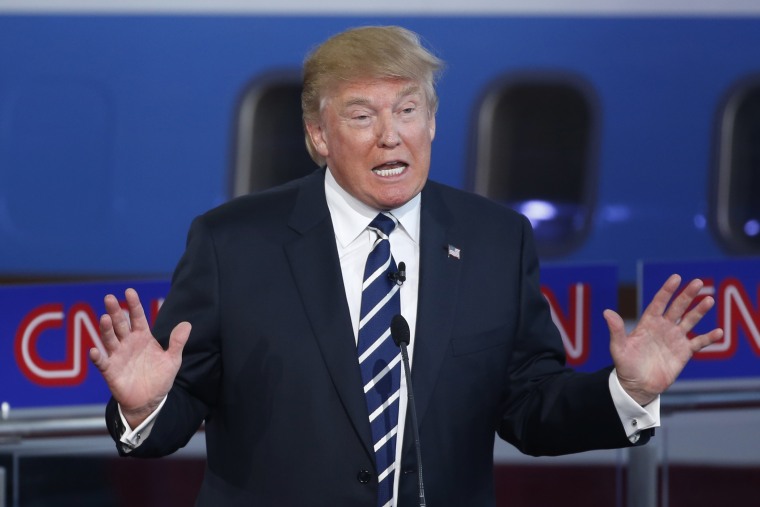It's bad enough when candidate debates feature bogus political information, but when the events convey misleading public-health information to the public, it's arguably quite dangerous.
Earlier this year, vaccinations turned into an unexpected litmus-test issue for Republican presidential candidates after some GOP hopefuls made controversial comments on the issue. Sen. Rand Paul (R-Ky.), for example, said, “I have heard of many tragic cases of walking, talking normal children who wound up with profound mental disorders after vaccines.” He soon after added, “I did not say vaccines caused disorders, just that they were temporally related."
In the months that followed, to the delight of the Republican establishment, the issue faded and the candidates steered clear of the issue.
Now, however, it's apparently back. In last night's CNN debate, Jake Tapper told Ben Carson that Donald Trump has linked vaccines and autism. Citing Carson's background as a medical professional, the moderator asked, "Should Mr. Trump stop saying this?" It seemed like an obvious opportunity for Carson to highlight his scientific expertise.
It didn't turn out that way. From the transcript:
"Well, let me put it this way, there has -- there have been numerous studies, and they have not demonstrated that there is any correlation between vaccinations and autism. "This was something that was spread widely 15 or 20 years ago, and it has not been adequately, you know, revealed to the public what's actually going on. Vaccines are very important. Certain ones. The ones that would prevent death or crippling. There are others, there are a multitude of vaccines which probably don't fit in that category, and there should be some discretion in those cases. But, you know, a lot of this is pushed by big government."
From there, for reasons that didn't make any sense, Carson started talking about taxes and the size of the federal workforce, which had no relation at all to a question about vaccines.
At which point, the entire discussion actually got worse.
Trump, naturally, weighed in, insisting that autism "has become an epidemic" and has "gotten totally out of control." The Republican frontrunner added, "I am totally in favor of vaccines, but I want smaller doses over a longer period of time."
He even had an anecdote to share. "Just the other day, two years old, two and a half years old, a child, a beautiful child went to have the vaccine, and came back, and a week later got a tremendous fever, got very, very sick, now is autistic," Trump said.
Carson, a retired neurosurgeon, responded, "[T]he fact of the matter is, we have extremely well-documented proof that there's no autism associated with vaccinations. But it is true that we are probably giving way too many in too short a period of time."
Rand Paul, a self-accredited ophthalmologist and the other doctor on last night's stage, added his own unhelpful take: "I'm all for vaccines. But I'm also for freedom. I'm also a little concerned about how they're bunched up. My kids had all of their vaccines, and even if the science doesn't say bunching them up is a problem, I ought to have the right to spread out my vaccines out a little bit at the very least."
A Washington Post report described the rhetoric as "dangerous" and at odds with guidance from both Centers for Disease Control and the Institute of Medicine.
We expect debates to be exasperating. We don't expect them to become a public-health menace.
What's more, while Republicans tend to be sensitive about the "anti-science" label, last night's debate featured rhetoric dismissing the seriousness of the climate crisis to rhetoric about vaccines that's badly at odds with reality.
If the GOP wants to shed its anti-science reputation, it has a very long way to go.
